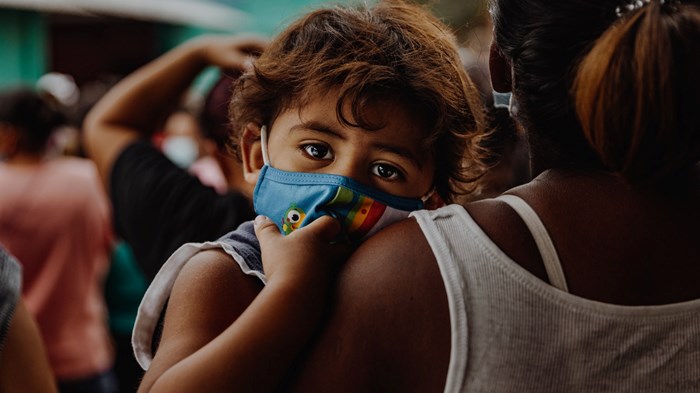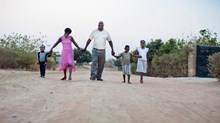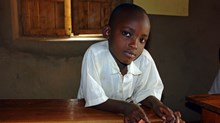Three Ways to Care for Children Orphaned by COVID-19

We are coming upon the two-year anniversary of the World Health Organization declaring COVID-19 to be a global pandemic. Since that time, over 415 million people have been infected and nearly 6 million have died from COVID-19. This does not include the untold numbers of people who have died from secondary factors caused by COVID-19 — extreme poverty, chronic food insecurity, an inability to flee violence and a lack of access to healthcare and other social services.
Countless millions of people have lost loved ones and are left grieving even as they fight to survive. In 2020, 1.2 million children lost a parent or caregiver due to COVID-19. That number has drastically increased. Every 6 seconds, a child loses a parent or caregiver as a direct result of COVID-19. According to the latest Lancet Report, from April 30 to October 31, 2021, 5.2 million children lost a parent or caregiver due to COVID-19.
Note the dates. What the research shows is a devastating trend: The number of children affected by COVID-19-associated orphanhood and caregiver death increased 90 percent in a 6-month timespan that came well over a year into when COVID-19 was declared a global emergency.
According to the Global COVID-19 Orphanhood Crisis report, it took 10 years for 5 million children to be orphaned due to AIDS, but it has taken just two years for 5 million children to be orphaned due to COVID-19. We begin to get a picture of the magnitude of this pandemic on our world’s most vulnerable.
Even as cases of COVID-19 and its variants begin to decrease in the U.S. and in other parts of the world, the impact on our world’s most vulnerable has hit record levels. The compounded effects of COVID-19 have had devastating consequences, and we need to turn to meet those most impacted. As we seek to pivot back to our daily lives, we must not leave behind those who are now burdened with extra layers of challenges that affect their ability to survive and thrive.
Empowering families and caregivers of orphaned children.
This begins with recognizing that most children who have lost a parent or caregiver often have other family members or support systems that can step in to help. This is almost always preferable to institutionalization and orphanages.
Unfortunately, many of those potential caregivers are stretched beyond their capabilities due to COVID-19-induced or exacerbated challenges that demand their attention. These include an increase in extreme poverty; environmental disasters and food insecurity due to climate change; interpersonal and social violence and mental health challenges and more.
The best way to care for these children is to empower their families and caregivers with economic, social, emotional and disease prevention support so they care for themselves and the children who are grieving the loss of a loved one. Let me suggest three ways churches and NGOs can do this:
First, tangibly set families and caregivers up for success.
One of the greatest needs many of these families have is economic stability. For many, COVID-19 has decimated their income and with the inclusion of children who have lost a caregiver, increased the number of mouths to feed. In fact, extreme poverty is a major concern in communities with many children who are orphaned. Globally, due to COVID, roughly 97 million more people are living on less than $1.90 a day, increasing the global poverty rate from 7.8 to 9.1 percent. Another 163 million more are living on less than $5.50 a day.
These families need an infusion of funds, financial literacy and savings support, and economic development training to build/rebuild livelihoods lost during the pandemic.
Second, care for the emotional and psychosocial needs of families, caregivers, and children dealing with grief, loss, and uncertainty.
The emotional strain that COVID-19 has caused will have reverberating effects years down the road. Long after financial stability has been achieved, the scars of these years will still be visible, and in some cases, the underlying wounds will still need to heal. Offering community and support services that promote wholeness are necessary in order for true hope to take root. This can be through trained community and faith leaders who can come alongside families to promote mental health and violence prevention services, parenting classes, school attendance and provide referrals for additional services as needed.
Just as Dr. Charles Nelson, Professor of Pediatrics and Neuroscience and Professor of Psychology in Psychiatry at Harvard Medical School, describes the children orphaned by COVID-19 as a “hidden cost of the pandemic,” so, too, are there other hidden costs. One is the cost of emotional and mental wounds silenced by more visible, outward scars. As we seek to meet the needs of these more vulnerable children and families, we must take a whole-person approach toward healing.
Finally, passionately pursue life through vaccine equality.
Many of these children and caregivers have seen more death and sadness than any person ought to. We must, therefore, fight for life, and the first step in doing this is to advocate for global vaccine equality and prioritize vaccine education and access. Currently, however, many factors are stalling efforts to get the most vulnerable the preventative care they need: misinformation about the vaccine, general mistrust of healthcare workers/healthcare, fear of getting sick in crowded health centers, various lockdowns and hard-to-access vaccination sites.
Research shows that just 4.2 percent of people in low-income countries have received a first dose of the COVID-19 vaccine, and across Africa, only 6.3 percent of people are fully vaccinated. Our first priority needs to be making it more likely that death due to COVID-19 will become less normative for these children and caregivers, and that, in turn, hope can begin to grow in each person’s heart individually and in the new family unit together.
Organizations like World Relief are coordinating with governments to make vaccines available to vulnerable populations and equipping faith leaders with accurate information that they are using to promote vaccine confidence and acceptance among their congregations.
The power of a loving and safe family is unmatched. As we support the children orphaned by COVID-19 and their remaining caregivers, we must do so with a whole-person, whole-family approach that affirms the critical role of the larger community in supporting these vulnerable families.
Lanre Williams-Ayedun is the Senior Vice-President of International Programs at World Relief.
The Better Samaritan is a part of CT's
Blog Forum. Support the work of CT.
Subscribe and get one year free.
The views of the blogger do not necessarily reflect those of Christianity Today.






















